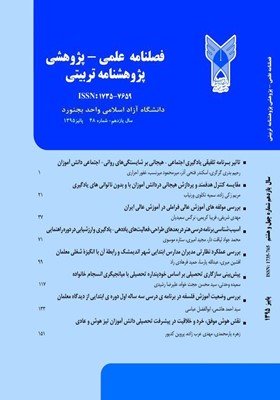مقایسه کنترل هدفمند و پردازش هیجانی در دانش آموزان با و بدون ناتوانی های یادگیری
محورهای موضوعی : علوم تربیتیمریم زکی زاده 1 , سمیه تکلوی ورنیاب 2 *
1 - دانش آموخته کارشناس ارشد گروه روان شناسی
2 - استادیار گروه روان شناسی، واحد اردبیل، دانشگاه آزاد اسلامی، اردبیل، ایران
کلید واژه: ناتوانی یادگیری, کنترل هدفمند, پردازش هیجانی,
چکیده مقاله :
هدف از این پژوهش مقایسه کنترل هدفمند و پردازش هیجانی در دانش آموزان با و بدون ناتوانی های یادگیری بود. روش پژوهش علی – مقایسه ای بود. جامعه آماری شامل کلیه دانش آموزان دوره ابتدایی شهرستان گرمی بود( 2300 = N). نمونه پژوهش(40 دانش آموز با ناتوانی یادگیری، 40 دانش آموز بدون ناتوانی یادگیری) با استفاده از روش نمونه گیری در دسترس انتخاب شد. جهت گردآوری داده ها از پرسشنامه های کنترل هدفمند و مقیاس پردازش هیجانی استفاده شد. داده ها با استفاده از آزمونt مستقل و تحلیل واریانس چند متغیره مورد تجزیه و تحلیل قرار گرفتند. فرضیه تحقیق حاضر این بود که "دانش آموزان با و بدون ناتوانی یادگیری در کنترل هدفمند و پردازش هیجانی تفاوت دارند". یافته های پژوهش نشان داد که در کنترل هدفمند و پردازش هیجانی دانش آموزان با و بدون ناتوانی یادگیری تفاوت معنی داری دارند. این نتایج مبین وجود نارسایی هایی در کنترل هدفمند و پردازش هیجانی در دانش آموزان مبتلا به ناتوانی یادگیری بوده و نیازمند برنامه هایی برای ارتقاء این متغیرها در دانش آموزان دارای ناتوانی یادگیری می باشد.
The aim of this study was to comparison of targeted control and emotional processing in students with and without learning disabilities. The study method was casual-comparative. The study population consisted of all elementary school student in Germy city (N= 2300). The sample of study (40 with learning disabilities and 40 without learning disabilities) were Selected by available method. To collect the data, targeted control and emotional processing scales were used. To analyze of data were used multivariate analysis of variance and t-test. The hypothesis of this study was that "students with and without learning disabilities had difference in targeted control and emotional processing ". The findings of research showed that there were significance difference in the targeted control and emotional processing of students with learning disabilities and without learning disabilities. The results were indicated that existence of some failure in the targeted control and emotional processing in learning disabilities, then the need for programs to promote these variables (targeted control and emotional processing) in students with learning disabilities.
_||_

